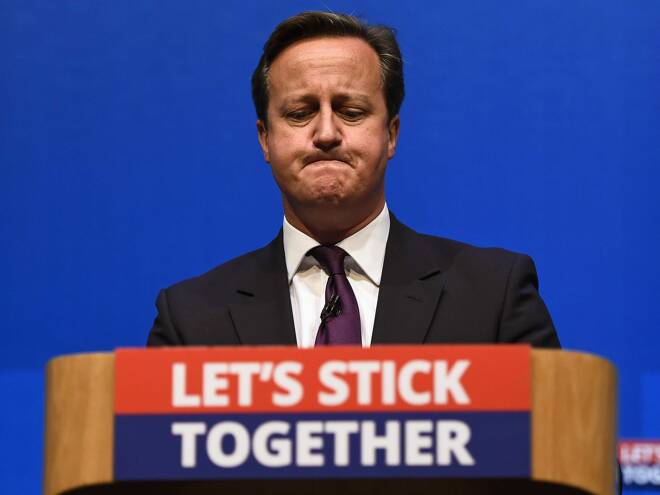Advertisement
Advertisement
The Pound Tumbles As UK Referendum Scheduled Effecting Global Markets
By:
The Great British pound fell over 100 points as markets opened on Monday morning after David Cameron called a referendum on June 23rd to determine if the
The Great British pound fell over 100 points as markets opened on Monday morning after David Cameron called a referendum on June 23rd to determine if the UK would remain in the Eurozone. After weeks of negotiations and several intensive days at the EU Summit last week, Mr. Cameron was able to return to the UK with a deal for “special status” for the UK providing resolutions to the biggest problems between the two partners.
As Mr. Cameron announced the agreement some of his major party members and longtime supporters jumped off the band wagon and called for the UK to exit the European Union.
Mr. Cameron announced the deal late on Friday and called for the referendum on Saturday morning. As soon as markets opened this morning the response has been plain and direct. Brexit seems to be more of a reality than a just a dream. The GBP is trading at 1.4284 down 121 points at this writing. The euro is down 20 points at 1.1111.
The breakup of the two trade partners will cause financial problems and stress for both. The Eurozone leaders as well as Mr. Cameron do not want to see the Brit’s exit the Union, but it might be a little too late as voters have made a major shift in the past months as Brexit is now leading in the polls. Immigration and terrorism have scared the English people down to their skivvies and they want to control their borders.
In the Asian currency markets, the kiwi gained to an eight-month high against the British pound as divisions in the UK’s ruling Conservative Party raised uncertainty about whether the country will remain in the European Union.
The kiwi touched 46.64 British pence, and was trading at 46.57 pence. The local currency edged up to 0.6634 against the US dollar. The pound slumped after London Mayor Boris Johnson said he was opposed to UK Prime Minister David Cameron’s bid to stay in the EU. However, Mr Johnson, a high profile, charismatic politician, later said he would vote to leave the Union. The chasm highlighted division in the UK’s Conservative Party and uncertainty around the outcome of the vote.
“While Cameron will be campaigning for the UK to stay in the EU, a quarter of his Cabinet will be voting the opposite and polls are evenly divided,” BNZ’s Jason Wong said.
This morning the Aussie was trading at 0.7150. The US dollar initially spiked to a nine-day high on Friday night in response to encouraging inflation data, but quickly reversed to a four-day low, supporting the Aussie. The Aussie also gained ground against British sterling following news that London’s Mayor will back the campaign for a British exit from the European Union.
Elsewhere the Japanese yen weakened against the US dollar and the euro as safe haven trades eased a bit while traders worry about the condition of the Japanese economy after the Bank of Japan moved to negative interest rates. The USDJPY is trading at 112.94 and the EURJPY is at 125.49. Japan has joined central banks in the euro area, Switzerland, Denmark and Sweden in introducing a negative rate policy, which is intended to spur bank lending by penalizing them for holding reserves at the central bank.
Speaking in parliament this morning, BOJ Governor Kuroda said that while there have been various reactions to the negative rates policy, he expects it will be positive for the economy and lead to an increase in lending.
Since the BOJ’s Jan. 29 move, the benchmark Topix index has plunged more than 7 percent and the yen has strengthened 5.5 percent against the dollar. Prime Minister Shinzo Abe on Saturday defended the negative-rate policy, saying it was not the cause of the current market turmoil. He blamed the Chinese economy, oil prices and the Federal Reserve’s rate hike and added that the rates individuals earn on deposits wouldn’t turn negative.
About the Author
Barry Normanauthor
Advertisement
